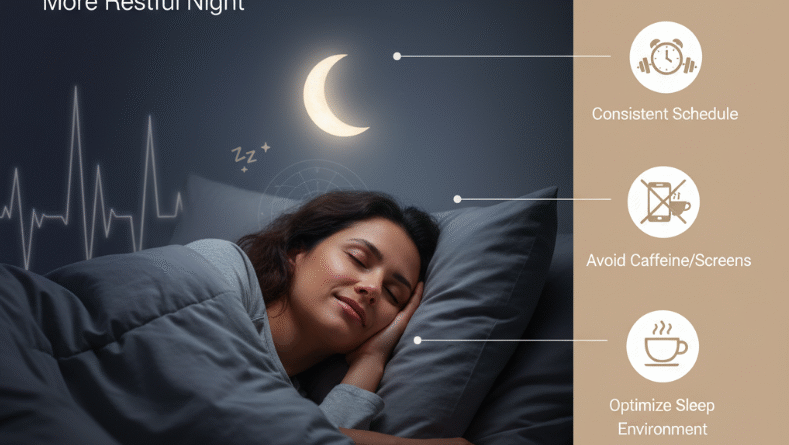The Science of Sleep: 5 Proven Strategies for a Deeper, More Restful Night
In our fast-paced world, many of us treat sleep as a luxury rather than a necessity. We cut corners on sleep to work more, socialize more, or simply get more done. But the truth is, a lack of quality sleep has a profound impact on our physical and mental health, affecting everything from our mood and concentration to our immune system and long-term health.1
The good news? Getting a good night’s rest isn’t a matter of luck. It’s a science. By understanding a few key biological principles and implementing proven strategies, you can significantly improve the quality of your sleep and, in turn, the quality of your life.
The Science Behind a Good Night’s Rest
Before we dive into the strategies, let’s quickly touch on the science. Your sleep is governed by two main biological processes:2
- Circadian Rhythm: This is your internal biological clock.3 It’s a 24-hour cycle that tells your body when to be awake and when to be sleepy.4 Light is the most powerful external cue for your circadian rhythm.5
- Sleep-Wake Homeostasis: This is the “sleep pressure” that builds up the longer you are awake.6 The more sleep pressure you build during the day, the deeper and more restful your sleep will be at night.
By working with these two processes, rather than against them, you can set the stage for a truly restorative night.
5 Proven Strategies for a Deeper, More Restful Night
1. Prioritize a Consistent Sleep Schedule
Your circadian rhythm thrives on consistency. Going to bed and waking up at roughly the same time every day—yes, even on weekends—is arguably the most important thing you can do for your sleep. This trains your body’s internal clock to expect sleep at a certain time, making it easier to fall asleep and wake up naturally.7
- Actionable Tip: Choose a bedtime and a wake-up time that allow you to get 7-9 hours of sleep. Stick to this schedule, even if you don’t feel tired at first. Your body will adjust.
2. Master Your Light Exposure
Remember, light is the most powerful signal for your internal clock. Your body’s production of melatonin—the hormone that makes you feel sleepy—is suppressed by light.8
- Morning Light: Get 15-30 minutes of natural sunlight as soon as possible after waking up. This strong light signal tells your circadian rhythm that it’s daytime, boosting your energy and alertness throughout the day.9
- Evening Light: In the hours before bed, dim the lights and avoid screens (phones, tablets, TVs).10 The blue light emitted by these devices mimics daylight, confusing your body’s internal clock and suppressing melatonin production.11 If you must use a screen, use blue light filters.
3. Create a “Decompression” Ritual
Your body and mind need time to wind down from the stresses of the day. You can’t just flip a switch and expect to fall asleep. Creating a consistent pre-sleep ritual tells your body that bedtime is approaching.12
- Actionable Tip: Your ritual could include a warm bath, reading a physical book, listening to calming music, or light stretching.13 The key is to make it a relaxing, screen-free activity that you do every night.
4. Optimize Your Sleep Environment
Your bedroom should be a sanctuary dedicated to sleep. A few simple changes can make a world of difference.
- Make it Cool: The ideal temperature for sleep is between 60-67°F (15-19°C). A slightly cooler room helps your body’s core temperature drop, which is a key part of the sleep process.14
- Make it Dark: Any light can disrupt sleep.15 Use blackout curtains to block out external light, and cover or remove any electronic devices with glowing lights.
- Make it Quiet: Use earplugs or a white noise machine to block out any disruptive noises that could wake you up.
5. Be Mindful of What You Consume
What you eat and drink—and when you consume it—can significantly affect your sleep quality.
- Limit Caffeine and Alcohol: Both can disrupt sleep.16 Caffeine is a stimulant, and its effects can last for hours.17 While alcohol may make you feel sleepy initially, it disrupts your sleep architecture later in the night, leading to fragmented and poor-quality sleep.18 Try to avoid both in the hours before bed.
- Time Your Meals: Avoid large, heavy meals right before bed, as your body will be focused on digestion rather than rest.19
Small Changes, Big Results
Achieving a truly restful night is a marathon, not a sprint. Don’t try to implement all these changes at once. Pick one or two strategies that feel manageable and stick with them. As you begin to feel the benefits of deeper sleep more energy, better focus, and improved mood you’ll be motivated to make sleep a non-negotiable part of your daily routine.
